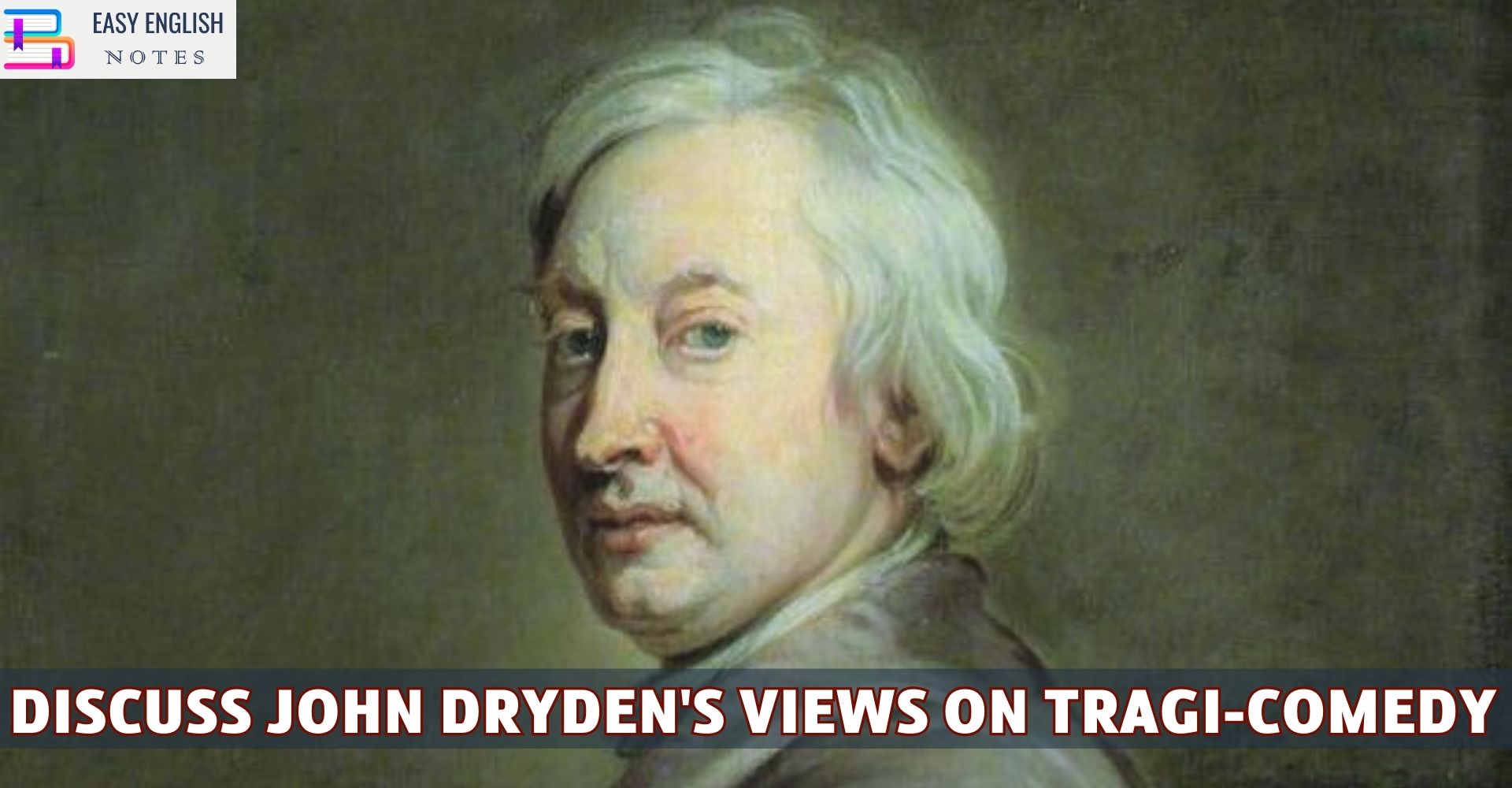Dryden is considered to be one of the greatest critics in English literature. In a few brief and suggestive statements, he has presented his views on tragi-comedy or the play in which mirth and grief are mingled, He neither elaborates nor illustrates them. The result is an air of vagueness in which much of his argument is wrapped.
At the outset he combats the remarks of Lisideius that we cannot so speedily recollect ourselves after a scene of great passion and concernment as to pass to another of mirth and humour, and to enjoy it with any relish. To this Dryden replies that he soul of man is not duller than his eye, and if the eye can pass from an unpleasant to a pleasant object smoothly and without shock, rather with greater delight, cannot the soul of the spectators make a similar transition, with equal delight while witnessing a tragi-comedy?
Then comes the first statement in support of the mixture in the reference to the old rule of logic that contraries, when placed near each other tend to set off each by contrast. The meaning is that a comic episode in tragedy serves to intensify the effect of the tragic scene which it follows.
As Shakespeare is the greatest and most successful writer of tragi- comedies we have to draw upon him for elaborating and substantiating this remark.
In Shakespeare’s Macbeth there is a brief scene of low comedy, known as the Porter scene, which follows the horrible murder of king Duncan, horrible because it is the murder of a good, innocent and truthful king who is staying as a guest in the palace of his murderer, at once his host, his kinsman and his brave commander whom he has recently rewarded for his patriotic heroism. The tragic effect has reached the highest pitch and our soul is completely overwhelmed with its horror.
Also Read :
- Compare Hamlet with Macbeth, Othello and other Tragedies
- “The Pardoner’s Tale” is the finest tale of Chaucer
- Prologue to Canterbury Tales – (Short Ques & Ans)
- Confessional Poetry – Definition & meaning
- Line By Line Explanation Of The Poem The Eve of St. Agnes
In King Lear the companionship of tragedy and comedy is symbolised in King Lear and his delicate fool. The king is smarting under the grievous wound his ungrateful daughter has inflicted on his heart and mind, and the fool is prattling about words so lightly uttered got the king into thinking of his folly till we begin to feel that he fool is really the conscience of the king which drives him to the height of tragedy.
The second argument of Dryden in favour of mingling mirth with tragic passion is a justification of what is known as ‘comic relief” in tragedy. He rightly argues that the mind, subject to continuous gravity is too much bent and tired to follow the dark story to the end unless it is relieved and diverted by light scenes of mirth and diversion which are similar to musical entertainment between the acts of a serious play.
Yet mixture of this successful sort is a rare achievement, because there are numerous cases of failure in this respect. Critics have pointed to the comic episodes in Marlowe’s Dr. Faustus, which are supposed to have been inserted by inferior hands. But here also there are comic episodes, which are the integral part of the career of the over-ambitious German scholar who sells away his soul to the Devil to reign as Jove upon this earth, holding kings and monarchs under his way. But when we find him actually engaged in performing magic feats before the princes for reward and wreaking his vengeance upon a saucy knight who appears with a pair of horns upon his forehead we are forced to realise the terrible irony inherent in the career of a learned man, blinded by his pride, who presumes to fly to the height of heaven with artificial wings provided by devilish power. This is the full implication of Dryden’s defence of Tragi- comedy.
In this respect the English plays are truer to nature because the serious ones abound in living characters and passions while the comedies have ‘humour’ in Jonsonian sense, that is laughable oddities in singular individuals: and the grace and liveliness present in the comedies of Fletcher where cultivated characters pursue a witty argument through a running series of repartees. It is also noteworthy that in Jonson one can find plays as regular as the French pieces while his discoveries can supply all the essential rules of drama of which the French neoclassicists are so proud.
They are really mistaken who believe that the contemporary English dramatists are beholden to French writers. Dryden stoutly contradicts this belief: “We have borrowed nothing from them: our plots are weaved in English looms; we endeavour therein to follow the variety and greatness of characters which ae derived to us from Shakespeare and Fletcher, the copiousness and well-knitting of the intrigues we have from Jonson and for the verse itself we have English precedents of elder date than any of Comeille plays.
PLEASE HELP ME TO REACH 1000 SUBSCRIBER ON MY COOKING YT CHANNEL (CLICK HERE)











